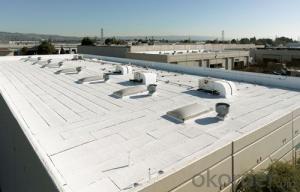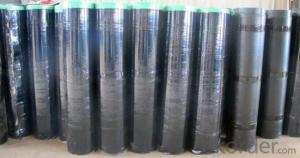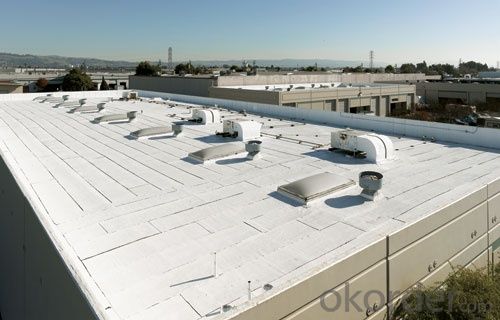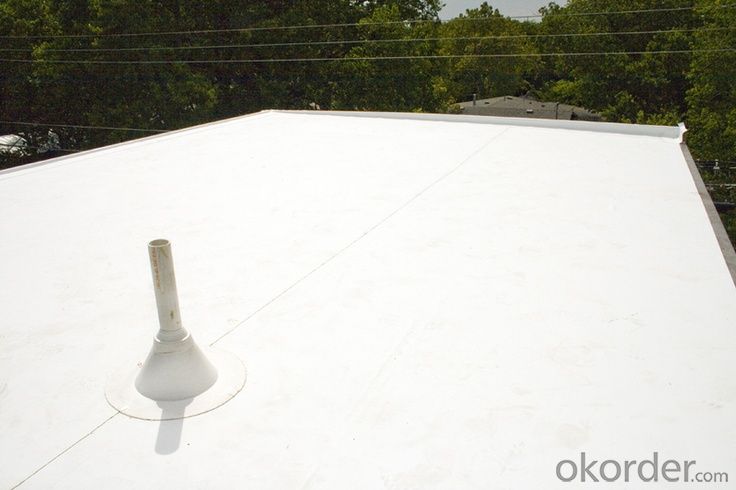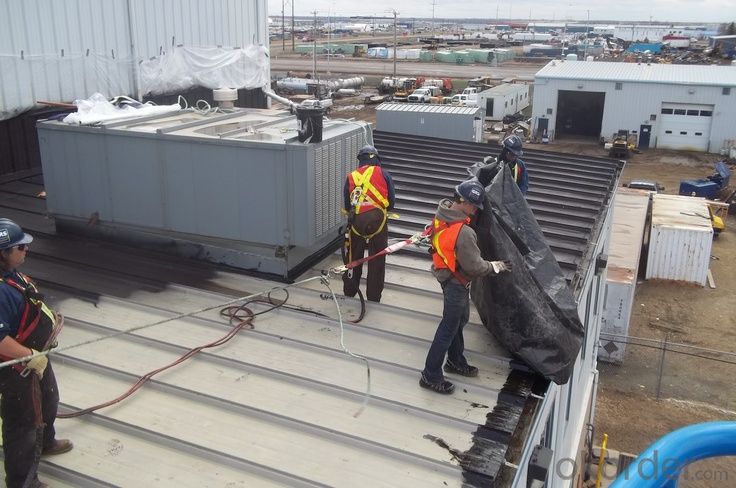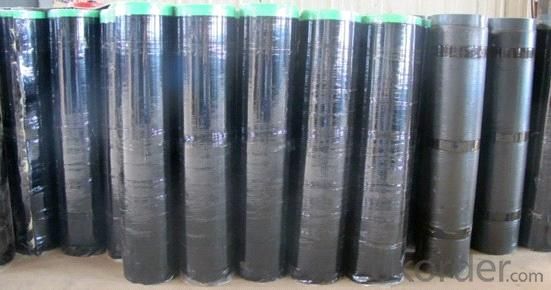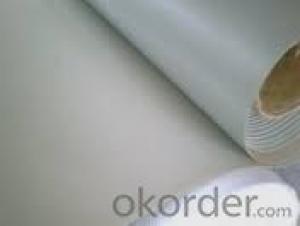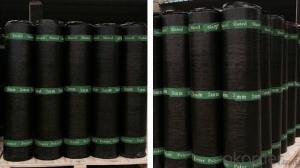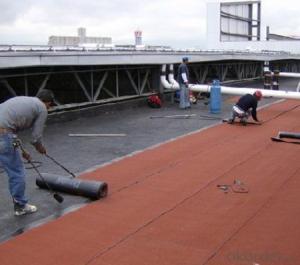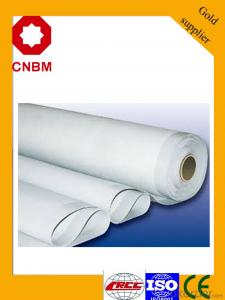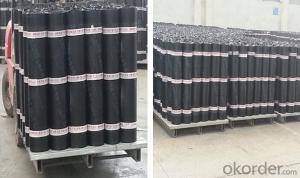SBS Waterproof Membrane, APP Waterproof Membrane, Asphalt Waterproof Membrane
- Loading Port:
- Shanghai
- Payment Terms:
- TT or LC
- Min Order Qty:
- 1000 m²
- Supply Capability:
- 200000 m²/month
OKorder Service Pledge
OKorder Financial Service
You Might Also Like
Product description
Specification | |
Width | 1m |
Length / roll | 7.5m / 10m / 15m or other |
Top Surface | PE film/Granules/Sand/Aluminum foil/Aluminum film... |
Apply method | a) One way is by heating and melting method.Heat the polyethylene film of the membrane and roof deck surface by heating and melting method to be nearly melted (not flowing),then install the membrane filly bonded to the roof deck with overlaps of 5-10cm. b) The other way is by cold adhesive method.Pour the cold adhesive homogeneously on the roof deck, then roll the membrane to install it to be fully sticked to roof deck. application as requested. c)After application,a full serious inspection is required to sure no air bubble, no falling away.etc. to guarantee the waterproof life. SBS waterproof membrane / APP waterproof membrane / Asphalt waterproof membrane for building waterproofing construction |
Construction Requirement | 1.The base should be dry and clean. Do not work in the rainy or snowy day. 2.Do not work under heavy wind(above 5 grade) 3.Unsuitable for construction below 5°C 4.If it is rain or snow in the process of construction, protective measure to the laid membrane is must. 5.All the workers should put on special uniforms to keep safe when installing. There should be equipments for fire controls. |
Packaging & Shipping
Package and transportation-- SBS waterproof membrane / APP waterproof membrane / Asphalt waterproof membrane for building waterproofing construction :
1. Torch on bitumen membrane sheets 4mm should be stored under dry and ventilated conditions.
2. Different types of membranes must be piled separately.
3. Under usual condition, storage period is one year since production date.
4. Membrane roll should be put vertically during transportation. It should be kept away from sunshine and rainwater.
.
Advantagee
1.Excellent anti aging performance ,service life up to 50 years.
2.High extension rate,high tensile strength ,small size changes at heat treatment.
3.Good plant roots penetrability resistance and can be made waterproofing layer of planting roof.
4.Special modified molecular structure ,effectively resolving the current domestic and foreign glue joint problem.
5.Good low temperature flexibility ,and good performance of adapting to ambient temperature changes.
6.Convenient application ,solid joint ,no environment pollution.
7.Chemical corrosion resistance ,can be used for special occasions.
8.Good anti-perforated.
Storage:
Different types or specifications of products should be separated, not mixed.
Keep it dry and ventilated, protected from the sun or rain.
Storage temperature should never be higher than 45 °C. Pile up the membranes flatwise whose stockpile height never exceeds five layers. One layer is guaranteed if it is placed vertically.
Prevent it from inclination or In the process of transportation, it should be lying in case of inclination or lateral pressure. If necessary, cover it with felt-cloth.
Storage time is at least one year from manufacture date on if the product is under normal operation of storage.
Technical Parameters
Item | Index | ||||||
1 | Thickness of resin layer of the middle fabric ,mm≥ | - | - | 0.40 | 0.40 | 0.40 | |
2 | Tensile performance | Max tensile strength,N/cm ≥ | - | 120 | 250 | - | 120 |
Tensile strength,NPa ≥ | 10 | - | -10 | - | - | ||
Max elongation% ≥ | - | - | 15 | - | - | ||
Breaking elongation % ≥ | 200 | 150 | - | 200 | 100 | ||
3 | Heat treatment size change rate%≤ | 2.0 | 1.0 | 0.5 | 0.1 | 0.1 | |
4 | Cold bonding | -25°c No cracks | |||||
5 | Watertightness | 0.3mPa,2h waterproof | |||||
product show
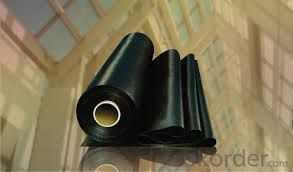
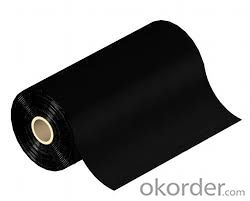
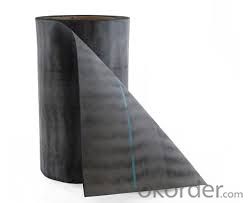
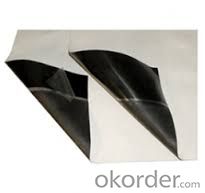
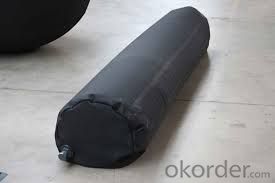
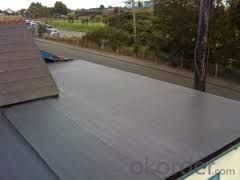
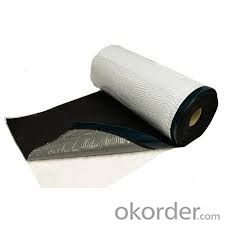

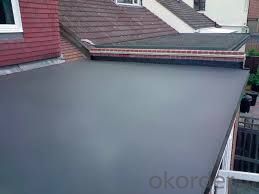
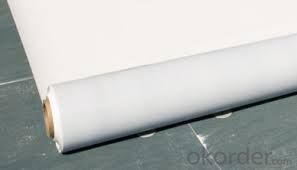
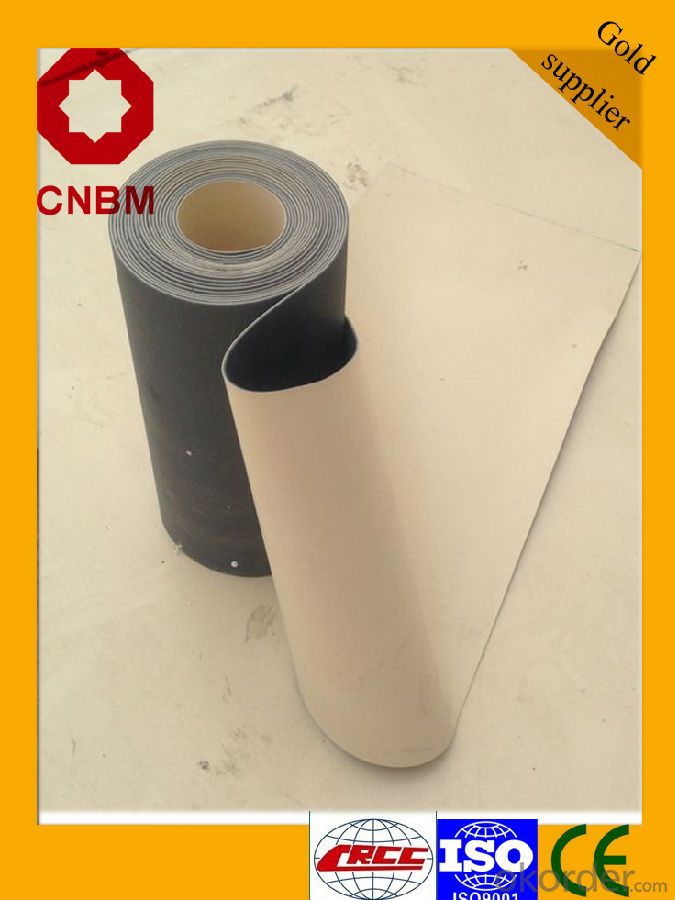
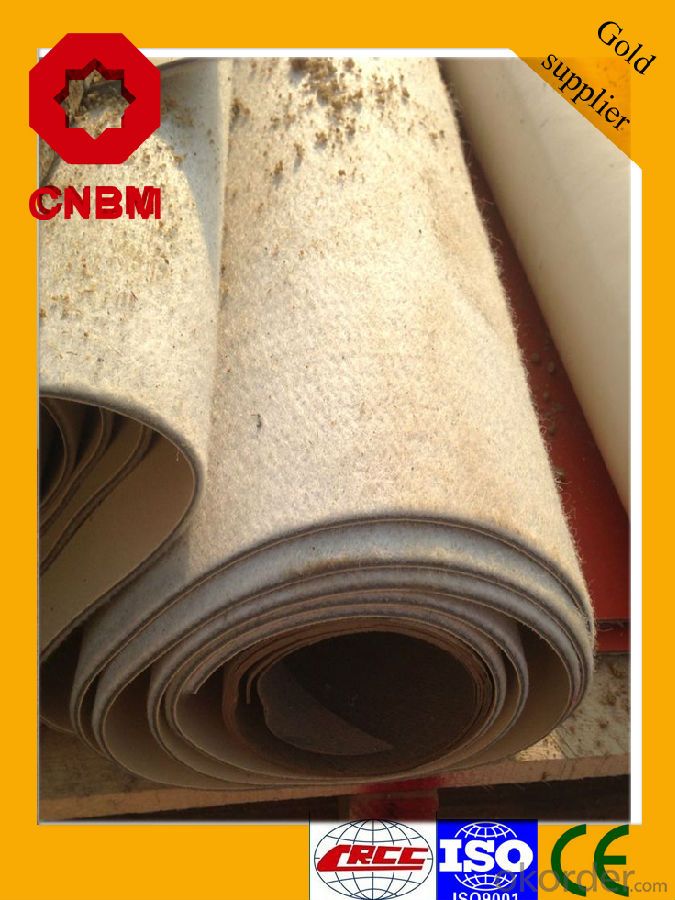
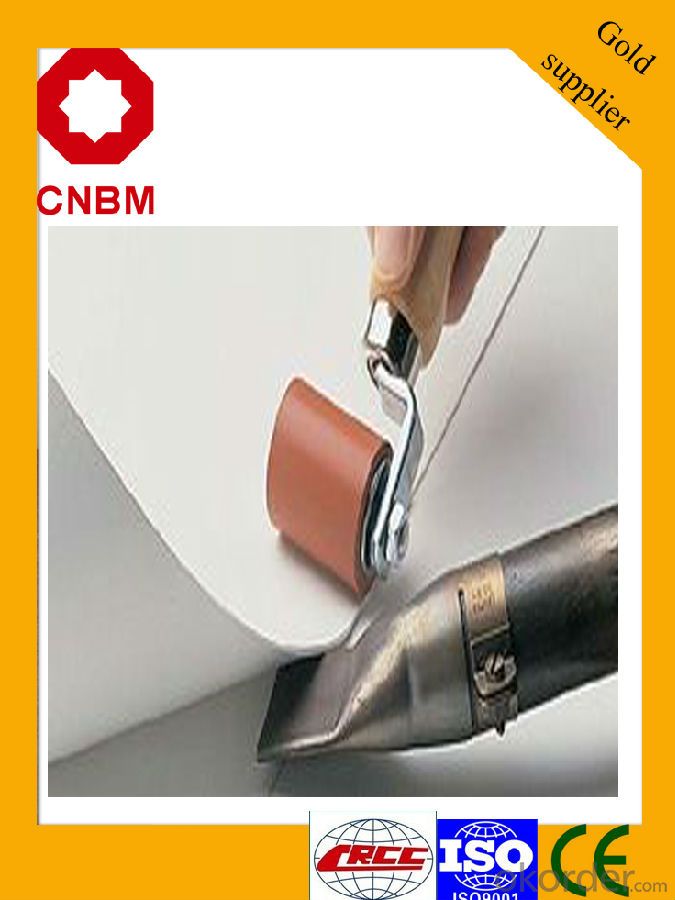
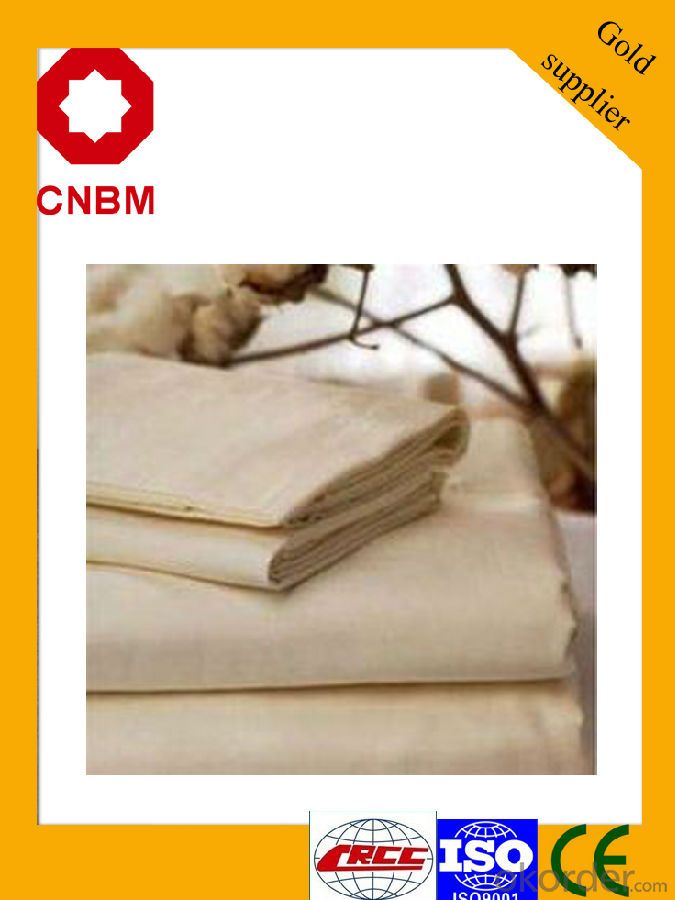
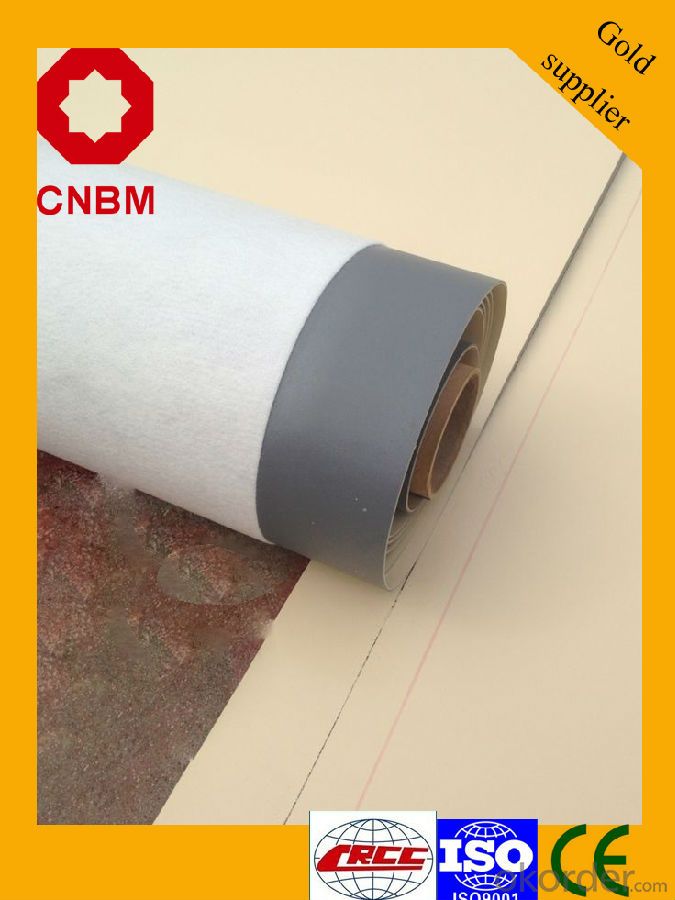
FAQ
Q: What's the de6abf1fe186f8d58506cbcfe46eed814d.jpglivery time ?
A: 3-5 days for 1-600 rolls, 10-15 days for container.
Q: What's the payment terms ?
A: TT/LC
Q: How do you make replacement with quality problems ?
A: New replacement will be packed into your next order or send to you directly after receive video or photo about quality problems.
- Q: Can a waterproofing membrane be used in bathrooms?
- Yes, a waterproofing membrane can be used in bathrooms. In fact, it is highly recommended to use a waterproofing membrane in bathrooms to prevent water damage and leakage. The membrane acts as a barrier, preventing moisture from seeping into the walls or floors, ensuring the longevity and durability of the bathroom.
- Q: Can a waterproofing membrane be recycled or disposed of in an environmentally friendly manner?
- Yes, a waterproofing membrane can be recycled or disposed of in an environmentally friendly manner. Many waterproofing membranes are made from recyclable materials such as polyethylene or polypropylene, which can be recycled into new products. Recycling these membranes not only reduces waste but also conserves resources and reduces the environmental impact of manufacturing new materials. To recycle a waterproofing membrane, it is important to check with local recycling facilities or waste management centers to see if they accept this type of material. Some facilities may have specific guidelines or processes for recycling membranes, so it is crucial to follow their instructions. In cases where recycling is not feasible, disposing of the waterproofing membrane in an environmentally friendly manner is still possible. Many waste management facilities have designated areas for construction and demolition waste, where the membrane can be properly disposed of. These facilities employ techniques to minimize the impact of the waste on the environment, such as containment and controlled disposal methods. It is essential to avoid disposing of the membrane in regular trash or dumping it illegally, as this can harm the environment and contribute to pollution. Proper disposal ensures that any potential pollutants or contaminants in the membrane are managed appropriately, preventing harm to ecosystems and human health. Overall, by recycling or disposing of a waterproofing membrane in an environmentally friendly manner, we can contribute to a more sustainable and cleaner future.
- Q: Can a waterproofing membrane be used for industrial facilities and factories?
- Indeed, industrial facilities and factories can utilize a waterproofing membrane. These establishments frequently feature areas that are exposed to moisture, such as basements, rooftops, and storage spaces. These particular areas are prone to water leakage and damage, which can lead to expensive repairs and operational downtime. A waterproofing membrane serves as an exceptionally effective solution for safeguarding these areas against water infiltration. It is a pliable and enduring barrier that is applied to surfaces, preventing water from penetrating through. Waterproofing membranes are engineered to withstand a range of environmental conditions, including temperature fluctuations, UV exposure, and chemical exposure, making them well-suited for industrial settings. Through the installation of a waterproofing membrane, industrial facilities and factories can avert water damage, mold growth, and structural decay caused by moisture. This preserves a safe and functional environment for workers and equipment, while also guaranteeing the longevity of the facility. Furthermore, a waterproofing membrane can contribute to enhanced energy efficiency by reducing heat loss through insulation and preventing water-related harm to HVAC systems. All in all, the utilization of a waterproofing membrane in industrial facilities and factories represents a practical and cost-effective approach to ensuring the protection and longevity of the facility.
- Q: Can a waterproofing membrane be used in coastal areas?
- Yes, a waterproofing membrane can be used in coastal areas. These membranes are specifically designed to withstand harsh weather conditions, including exposure to saltwater, high humidity, and extreme temperatures. They provide an effective barrier against water penetration and can protect structures from the damaging effects of coastal environments.
- Q: Can waterproofing membranes be used on outdoor patios?
- Yes, waterproofing membranes can be used on outdoor patios. They are an effective way to protect the patio from water damage and can help to prevent leaks and moisture penetration. Waterproofing membranes create a barrier between the patio surface and water, keeping it dry and extending its lifespan.
- Q: Can a waterproofing membrane be used for crawl spaces or basements?
- Yes, a waterproofing membrane can be used for crawl spaces or basements. In fact, it is one of the most effective methods to prevent water infiltration and moisture issues in these areas. Waterproofing membranes are designed to create a protective barrier against water, preventing it from seeping into the crawl space or basement. They are typically made from durable materials such as rubber, PVC, or polyethylene, which are resistant to water penetration. These membranes are installed on the walls and floors of the crawl space or basement, creating a watertight seal. This helps to keep the area dry, prevent water damage, and reduce the risk of mold and mildew growth. Additionally, waterproofing membranes can also act as a vapor barrier, preventing moisture from evaporating from the ground and entering the crawl space or basement. Overall, using a waterproofing membrane is a recommended solution for maintaining a dry and healthy crawl space or basement.
- Q: Can waterproofing membranes be used on buried pipelines?
- Yes, waterproofing membranes can be used on buried pipelines. Waterproofing membranes are designed to provide a protective barrier against water and moisture, and they can be applied to various surfaces, including buried pipelines. The membranes are typically made of materials such as bitumen or synthetic polymers, which are resistant to water penetration. When applied to buried pipelines, waterproofing membranes help prevent water infiltration, which can cause corrosion and deterioration of the pipeline material. They act as a barrier, preventing water from reaching the pipeline's surface and protecting it from potential damage caused by moisture. Additionally, waterproofing membranes also offer protection against other external factors, such as soil chemicals or gases, which can potentially cause harm to the pipeline. By creating a waterproof barrier, the membranes help extend the lifespan of buried pipelines, reduce maintenance costs, and improve overall performance. It is important to note that the selection and application of waterproofing membranes should be carried out by professionals who are knowledgeable in pipeline construction and waterproofing systems. Proper installation techniques and compatibility with the pipeline material are crucial to ensure the effectiveness of the waterproofing membranes.
- Q: Can a waterproofing membrane be used in commercial buildings?
- Yes, a waterproofing membrane can be used in commercial buildings. It is commonly used as a protective barrier to prevent water infiltration in various areas such as basements, roofs, and foundations. The membrane acts as a reliable solution to ensure the longevity and structural integrity of commercial buildings, protecting them from potential water damage and leaks.
- Q: Does a waterproofing membrane provide any soundproofing benefits?
- A waterproofing membrane, unfortunately, does not offer any advantages in terms of soundproofing. Its sole purpose is to safeguard surfaces against water infiltration, such as roofs, walls, or foundations. It is typically composed of materials like asphalt, rubber, or polyethylene, which are not effective in obstructing or absorbing sound waves. On the other hand, soundproofing entails the utilization of distinctive materials and techniques that can diminish or eradicate the transmission of sound from one area to another. This may involve insulation, acoustic panels, or soundproof barriers. Consequently, if soundproofing is a concern, it is essential to contemplate separate soundproofing measures in conjunction with a waterproofing membrane.
- Q: Can a waterproofing membrane be certified or approved by industry organizations?
- Yes, a waterproofing membrane can be certified or approved by industry organizations. These organizations typically have stringent standards and testing procedures in place to ensure that the membrane meets certain performance criteria for waterproofing applications. Certification or approval from such organizations provides assurance of the quality and reliability of the product, giving confidence to consumers and industry professionals.
Send your message to us
SBS Waterproof Membrane, APP Waterproof Membrane, Asphalt Waterproof Membrane
- Loading Port:
- Shanghai
- Payment Terms:
- TT or LC
- Min Order Qty:
- 1000 m²
- Supply Capability:
- 200000 m²/month
OKorder Service Pledge
OKorder Financial Service
Similar products
Hot products
Hot Searches
Related keywords
